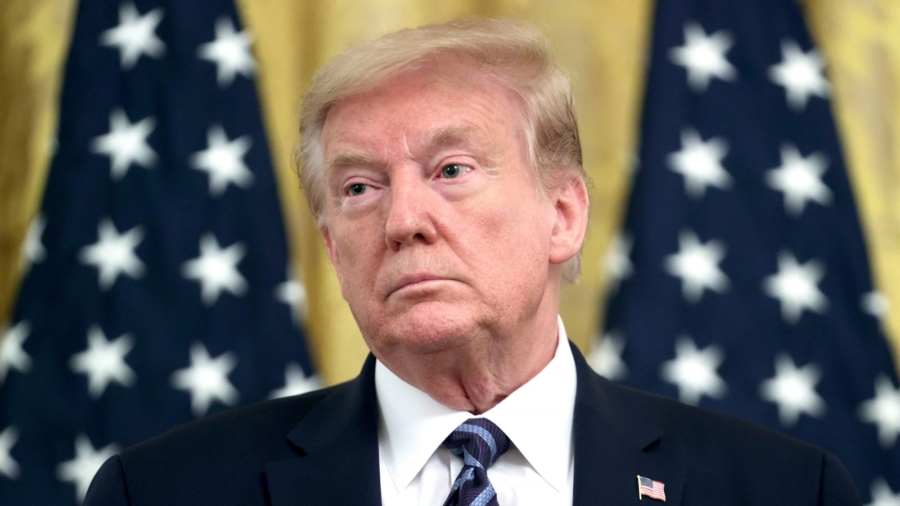WASHINGTON—President Donald Trump said defaulting on debt is a “rough game” amid calls from some Republicans that the United States should refuse to pay its debt obligations to China as a retaliatory measure for its mishandling of the CCP virus outbreak.
On April 30 during the “Protecting America’s Seniors” event at the White House, Trump suggested that his administration could impose new tariffs on Chinese goods as a way to compensate for losses the United States has incurred due to the pandemic.
“Well, I can do it differently. I can do the same thing, but even for more money just by putting on tariffs,” he said.
Some Republicans, including Sen. Lindsey Graham (R-S.C.), proposed the United States cancel its trillion dollars of U.S. Treasury securities held by China.
China owned about $1.09 trillion in U.S. debt as of February, according to the U.S. Treasury Department. It is the second-largest U.S. foreign creditor, following Japan, at $1.26 trillion.
“You start playing those games and that’s tough. We have the dollar to protect. We want to protect the sanctity of the dollar, the importance of the dollar. It’s the greatest currency in the history of the world,” Trump said.
“That’s why we’re borrowing at zero, zero interest rate,” he continued.
“We can do it with tariffs. We can do it other ways, even beyond that, without having to play that game. That’s a rough game.”
Economists believe canceling the debt would damage the credibility of the U.S. government. Such a move would drop the value of U.S. government bonds and increase the interest rates, causing a global financial turmoil.
“Absolutely not. Full faith and credit of U.S. debt is sacrosanct. And so is dependable currency as the world’s reserve currency. Period. Full stop,” top White House economic adviser Larry Kudlow told Politico on April 30, when asked about the possibility of canceling debt held by China.
White House press secretary Kayleigh McEnany, during her first official press briefing on May 1, criticized the Chinese regime for mishandling the CCP (Chinese Communist Party) virus, also known as the novel coronavirus.
“We take displeasure with China’s actions, but I certainly won’t get ahead of the President with those announcements,” she said in response to a question about whether the president was seriously considering new tariffs on China.
“It’s no secret that China mishandled the situation,” McEnany told reporters.
She listed cover-up efforts by Beijing, saying that “they did not share the genetic sequence until a professor in Shanghai did so on his own. The very next day, China shut down his lab for, quote, ‘rectification.’”
“They slow-walked information on human-to-human transmission alongside the World Health Organization and didn’t let U.S. investigators in at a very important time,” she added.
Wuhan Virus
McEnany defended Trump’s claims that the CCP virus could have originated from a laboratory in Wuhan.
The U.S. National Intelligence Director’s office stated on April 30 that it was still investigating “whether the outbreak began through contact with infected animals or if it was the result of an accident at a laboratory in Wuhan.”
“The Intelligence Community also concurs with the wide scientific consensus that the COVID-19 virus was not manmade or genetically modified,” the statement said.
In response, McEnany said, “The President’s statement is consistent with the other intelligence assessments. While we continue to have very limited and dubious data from China, current assessments indicated that President Trump’s statement is consistent with what some analysts believe is the epicenter of where the virus began.”
Trump earlier said that he had a high degree of confidence that the Wuhan Institute of Virology was the origin of the virus.
When asked by a reporter what gave him such confidence, Trump said, “I can’t tell you that. I’m not allowed to tell you that.”
‘China Bias’
During the press briefing, McEnany echoed Trump’s criticism of the World Health Organization (WHO).
“The WHO appears to have a very clear China bias,” she said. “On Dec. 31 you had Taiwanese officials warning about human to human transmission, WHO did not make that public.”
“On Jan. 9, WHO repeated China’s claim that the virus, quote, ‘does not transmit readily between people.’ That was quite apparently false. On Jan. 14, WHO again repeated China’s talking points about no human to human transmission,” she continued.
And on Feb. 29, “when the coronavirus was spreading around the world they chose to put political correctness first by opposing life-saving travel restrictions.”
A growing number of countries have stepped up calls for more transparency from the Chinese regime, and for an investigation into Beijing’s handling of the outbreak. Two U.S. states, Mississippi and Missouri, have filed lawsuits against the regime, seeking damages for the human and economic costs of the pandemic on Americans.
Cathy He contributed to this report.
From The Epoch Times

